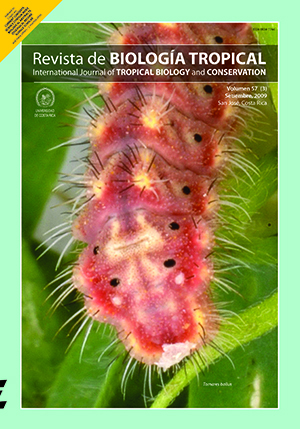Abstract
This research presents evidence showing that: (1) lower arthropod herbivory correlates with seedling survival, and (2) spider presence correlates with lower arthropod herbivory, seedling growth, and seedling survival of the tropical rainforest tree species Dipteryx oleifera in eastern Nicaragua. The study was conducted from January 2005 to January 2006 in a 6.37 ha permanent plot established in 2002. Seedling height, spider behavior and presence on seedlings, and percentage of leaf area lost due to arthropod herbivory were measured. Arthropod herbivory was assessed from digital photographs of each seedling within the permanent plot. Seedling fate was followed in order to determine its correlation with spider presence, initial seedling size, and arthropod herbivory. A GLM showed that seedling survival correlated negatively with lower levels of arthropod herbivory ( < 20%), while seedlings with higher levels of herbivore damage experienced mortalities close to 100%. Results from another GLM suggests that seedling mean height (aprox. 8 cm) would be increased by approximately 1.5 cm for each year that spiders were present on seedlings and would be decreased 0.75 cm in height for each percent unit of arthropod herbivory. We also report a trend toward lower arthropod herbivory in seedlings colonized by spiders with aggressive traits, presumably because more aggressive spiders better defended seedlings against herbivorous arthropods than less aggressive spiders.Comments

This work is licensed under a Creative Commons Attribution 4.0 International License.
Copyright (c) 2009 Revista de Biología Tropical
Downloads
Download data is not yet available.






